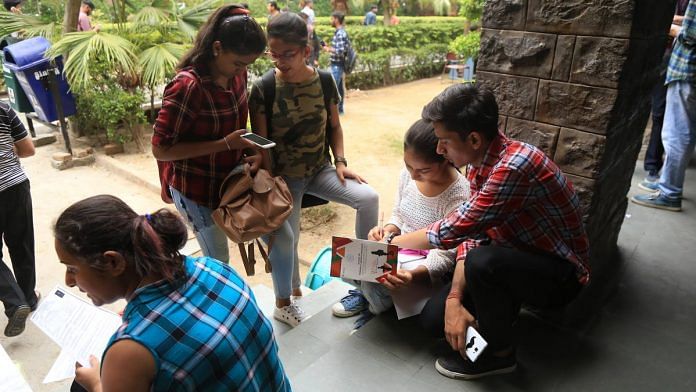New Delhi: Nearly 44 per cent students voted in favour of studying engineering in their mother tongue, with Tamil and Hindi being the most preferred choices, a survey conducted by the All India Council for Technical Education (AICTE) has found.
The survey ‘Undergraduate Engineering Education in Mother Tongue’ was conducted in the month of February and released Friday. It was limited to colleges approved by the council and reached over 83,000 students.
The Ministry of Education had last November announced that engineering institutions, including Indian Institutes of Technology (IITs) and National Institutes of Technology (NITs) will be able to offer engineering education in mother tongues from the next session.
Following the announcement, a committee comprising members of AICTE, IITs and NITs was formed to look at the feasibility of the idea. The AICTE survey is part of this process.
“In order to access the viewpoint of the stake holders, especially the students, AICTE conducted the survey of undergraduate engineering students where 83,195 students have found to be responded to the survey (sic),” the survey report read.
Also read: NEP allows schools to teach in mother tongue, but parents wonder which language it will be
How students responded
Survey participants — students from first to fourth year of engineering — were asked whether they would take the option of pursuing engineering in their mother tongue if given an option. Of the respondents, 43.79 per cent responded in the affirmative: 74.33 per cent students were males and 25.67 per cent were females.
When given the option of language, Tamil was the language picked by most students (12,487 students), followed by Hindi (7,818), Telugu (3,991) and Marathi (3,226).
The survey also found that the percentage of students opting for instruction in their mother tongue was higher among those well into their engineering degree, i.e., the percentage gradually increased from first year onwards.
Out of the total students who opted for their mother tongue, 38.20 per cent were in their first year, 44.60 per cent in their second year, 45.81 per cent in their third and 43.72 per cent in their fourth.
“As the percentage of the responses favouring engineering education in mother tongue is comparatively increasing, it means that students are more enthusiastic to have their engineering education in the English, however as they progress further, they found themselves to be uncomfortable to learn with English language, hence the response goes on increasing favouring the education in the mother tongue (sic),” the survey report adds.
The NEP 2020 advocates for education in one’s mother tongue right from primary class onwards.
In line with the policy, Education Minister Ramesh Pokhriyal Nishank has been pushing for education in regional languages. In an interview to ThePrint in August last year, Pokhriyal said that education in one’s mother tongue should be imparted wherever possible. He also advocated the same at public forums and seminars that took place after the NEP announcement.
(Edited by Manasa Mohan)
Also read: The mother tongue fanatics are keeping India a poor, backward country




Only in English mode of teaching, everywhere..to survive anywhere in the world
The last I read, 41% of “graduated” engineers are unemployed in Tamil Nadu now. Guess they want 99% to be unemployed after being taught by honorary PhD professors placed in colleges for teaching in Tamil. Sheesh…….. this is mirror opposite of Hindi fanatics you see around in that northern feku state called UP.
It would be disastrous to start teaching professional courses in vernacular languages. Knowledge repository is predominantly in English and to convert them into dozens of vernacular languages is expensive and unnecessary. It is entirely another matter for countries like Germany, France, Japan, China etc who have had the practice of educating their people in their languages and consequently have also built up a vast compendium of knowledge in their languages. But for India to go down this path is shortsighted. English is a language that can bring the country together as its lingua franca and also with the rest of the world. To turn our backs to this at a time when will be increasingly coordinating and cooperating with English countries exposes a lack of long-term thinking. Also, English being of foreign origin doesn’t have the stigma of caste discrimination carried by Indian languages. Instead, technology must be used innovatively to help students understand English texts in their native languages through the use of AI while still maintaining & improving their English proficiency.